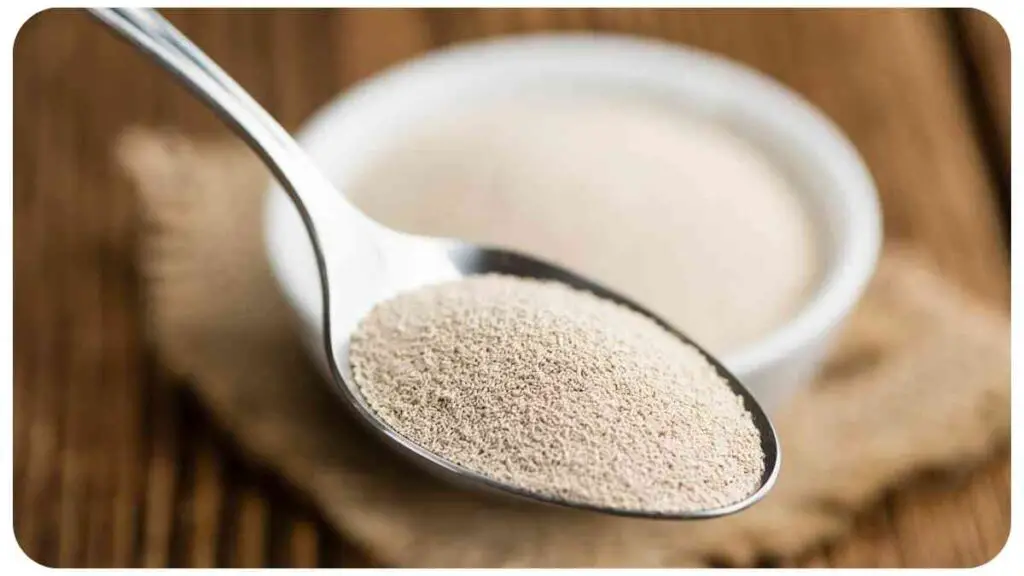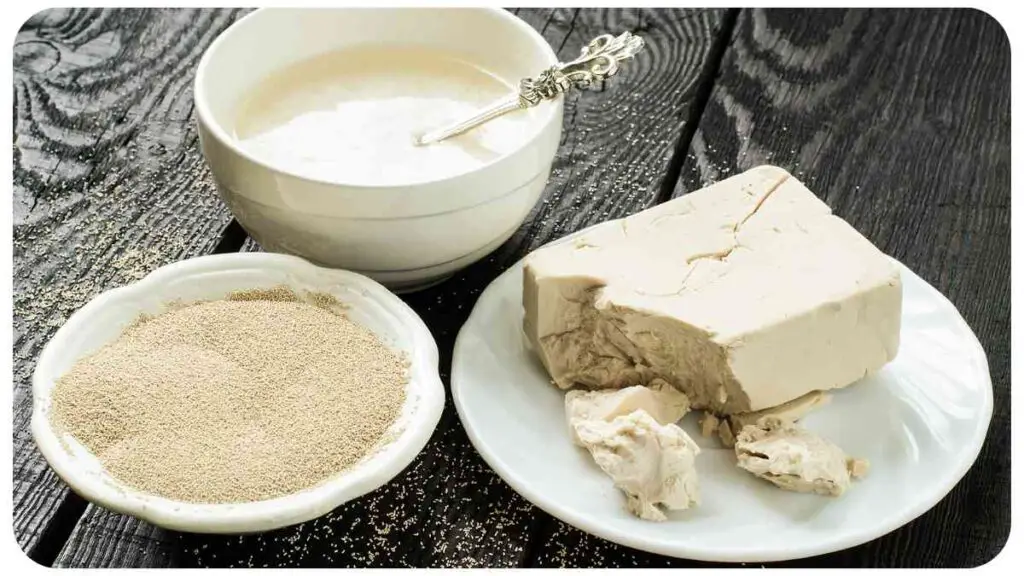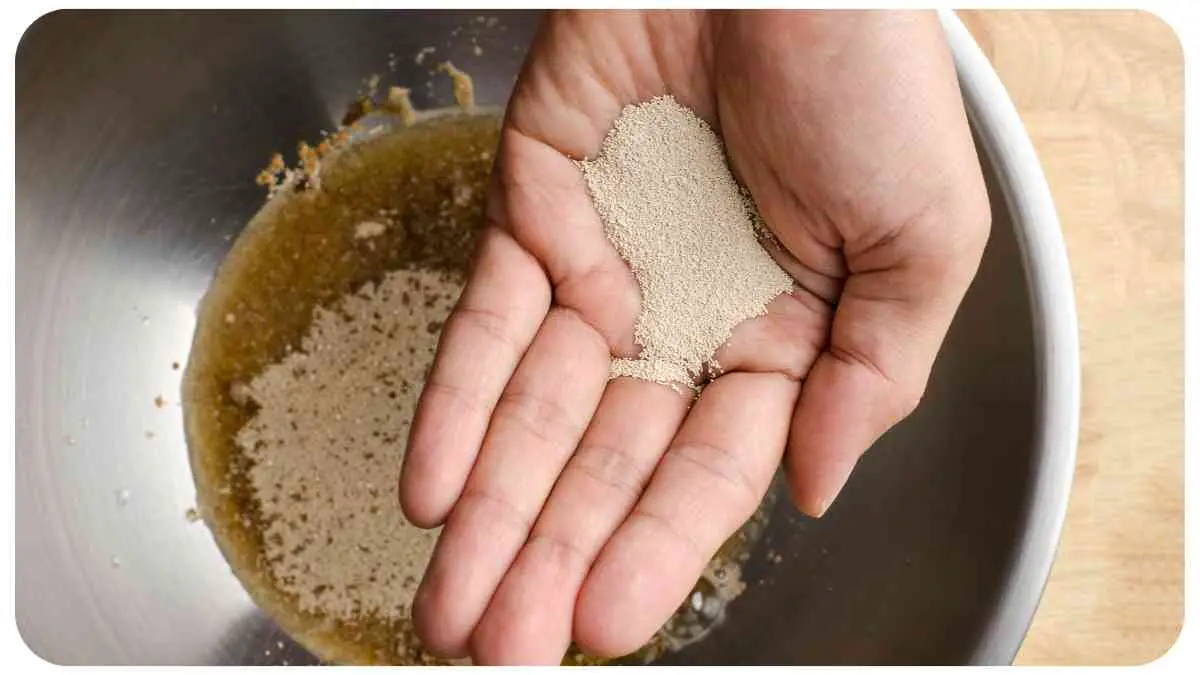In today’s world, veganism has gained tremendous popularity due to its countless health benefits, ethical considerations, and environmental concerns. However, the question often arises: Can vegans consume yeast?
In this article, we will explore the facts surrounding yeast and its compatibility with a vegan diet.
| Key Points |
|---|
| – Yeast is suitable for a vegan diet and is commonly consumed by vegans. |
| – Yeast provides valuable nutritional benefits, including protein, fiber, and essential B vitamins. |
| – Nutritional yeast, in particular, is a popular choice among vegans for its cheesy flavor and high nutritional content. |
| – Yeast can be incorporated into various vegan recipes, such as bread, pasta dishes, and sauces, to enhance flavor and texture. |
| – Some yeast products are fortified with vitamin B12, making them a convenient source of this important nutrient for vegans. |
| – It’s important to listen to your body and address any specific concerns or allergies related to yeast consumption. |
| – Consulting with a healthcare professional or registered dietitian can provide personalized advice on incorporating yeast into your vegan diet. |
2. Understanding Veganism
Before we delve into the specifics of yeast consumption, let’s briefly understand what veganism entails. Vegans choose to abstain from consuming any animal-derived products, which includes meat, poultry, fish, dairy, eggs, and honey.
When it comes to dairy alternatives, finding the perfect vegan milk for your needs is crucial. Learn about different options, from almond milk to oat milk, in our comprehensive vegan milk alternatives guide. Make informed choices for a well-rounded vegan diet.
They opt for a plant-based lifestyle that promotes compassion towards animals and strives for sustainability.
3. What Is Yeast?

Yeast is a single-celled fungus that belongs to the fungi kingdom. It is widely used in the culinary world due to its ability to ferment and leaven various food products. The most common type of yeast, Saccharomyces cerevisiae, is employed in the baking and brewing industries, while nutritional yeast is commonly used as a food additive and flavor enhancer.
4. Nutritional Composition of Yeast
Yeast is not only known for its culinary applications but also for its impressive nutritional content. It is a great source of protein, dietary fiber, B vitamins, and minerals such as iron, zinc, and selenium. Additionally, yeast is often fortified with vitamin B12, making it an essential addition to a vegan diet.
| Nutrient | Amount per 100g |
| Protein | 48g |
| Dietary Fiber | 29g |
| Vitamin B1 (Thiamin) | 15.3mg |
| Vitamin B2 (Riboflavin) | 10.5mg |
| Vitamin B3 (Niacin) | 113mg |
| Vitamin B6 (Pyridoxine) | 6.7mg |
| Folate | 3315µg |
| Iron | 10.7mg |
| Zinc | 17mg |
| Selenium | 136µg |
5. Is Yeast Vegan-Friendly?
Yeast is indeed vegan-friendly, as it is a microorganism and not derived from animal sources. It is harvested through a fermentation process and does not involve any harm or exploitation of animals. However, it’s important to differentiate between different types of yeast, as not all varieties are suitable for vegans.
Looking for vegan substitutes in your baking recipes? Our comprehensive guide on vegan baking substitutes provides you with a variety of plant-based alternatives. Discover how to replace traditional ingredients and create delicious vegan treats without compromising taste or texture.”
6. Different Types of Yeast
There are several types of yeast available in the market, and understanding their differences is vital for vegans. The primary varieties include baker’s yeast, brewer’s yeast, nutritional yeast, and yeast extracts. Let’s have a closer look at each type.
| Type of Yeast | Description |
| Baker’s Yeast | Used for baking bread and other baked goods. |
| Brewer’s Yeast | Utilized in the production of beer and wine. |
| Nutritional Yeast | Offers a cheesy, nutty flavor and serves as a vegan substitute for cheese. |
| Yeast Extracts | Concentrated forms of yeast used as flavor enhancers. Often found in savory food products. |
7. Nutritional Benefits of Yeast for Vegans

As mentioned earlier, yeast is not only vegan-friendly but also offers numerous nutritional benefits for those following a plant-based diet. Let’s take a closer look at the nutritional composition of yeast and its significance for vegans.
Table: Nutritional Composition of Yeast
| Nutrient | Amount per 100g |
| Protein | 48g |
| Dietary Fiber | 29g |
| Vitamin B1 (Thiamin) | 15.3mg |
| Vitamin B2 (Riboflavin) | 10.5mg |
| Vitamin B3 (Niacin) | 113mg |
| Vitamin B6 (Pyridoxine) | 6.7mg |
| Folate | 3315µg |
| Iron | 10.7mg |
| Zinc | 17mg |
| Selenium | 136µg |
Yeast serves as an excellent source of protein, making it ideal for vegans who may struggle to meet their daily protein needs. It also contains high levels of dietary fiber, aiding in digestion and promoting a healthy gut.
Furthermore, yeast is rich in essential B vitamins, including thiamin (B1), riboflavin (B2), niacin (B3), and pyridoxine (B6). These vitamins play a crucial role in maintaining overall health and supporting metabolic processes. Yeast is particularly notable for its exceptional folate content, which is vital for pregnant women and for the development of healthy red blood cells.
In addition, yeast provides significant amounts of minerals such as iron, zinc, and selenium. These minerals are essential for maintaining healthy immune function, promoting cell growth, and supporting various physiological processes.
Is honey suitable for vegans? Delve into the debate surrounding ethical choices in our article discussing whether honey is vegan. Understand the different perspectives and make informed decisions about including honey in your vegan lifestyle.
8. Incorporating Yeast into a Vegan Diet
Introducing yeast into a vegan diet is incredibly simple and can add a delightful depth of flavor to a wide variety of dishes. Nutritional yeast, in particular, has become a popular choice among vegans, thanks to its cheesy and nutty flavor profile. Here are some creative ways to incorporate yeast into your daily meals:
- Sprinkle nutritional yeast over popcorn for a savory twist.
- Use it as a topping for pasta, salads, or roasted vegetables to add an umami flavor.
- Incorporate it into homemade vegan cheese sauces for a creamy texture and cheesy taste.
- Blend nutritional yeast with nuts and spices to create a delicious vegan parmesan alternative.
By experimenting with different recipes and culinary techniques, you can elevate the taste and nutritional value of your vegan meals.
Understanding vegan nutrition is essential for a well-balanced diet. Explore our comprehensive guide on decoding vegan nutrition to discover key principles, nutrient sources, and gain insights into consuming yeast and other essential elements in a vegan lifestyle.
9. Yeast-Based Recipes for Vegans
Now that we understand the nutritional benefits of yeast, let’s explore some mouthwatering yeast-based recipes that are perfect for vegans. These recipes not only utilize the goodness of yeast but also provide a delightful dining experience.
Table: Delicious Yeast-Based Recipes
| Recipe | Description |
| Vegan Cheesy Garlic Bread | A delectable combination of crusty bread, vegan butter, garlic, and nutritional yeast. |
| Creamy Vegan Mac and Cheese | A comforting pasta dish made with a creamy sauce featuring nutritional yeast for a cheesy flavor. |
| Vegan Pizza | Top your homemade pizza crust with tomato sauce, vegetables, vegan cheese, and nutritional yeast. |
| Vegan Pesto Pasta | A twist on traditional pesto using nutritional yeast instead of parmesan for a cheesy taste. |
| Vegan Cauliflower Alfredo | A creamy and velvety cauliflower-based alfredo sauce enriched with nutritional yeast. |
These recipes are just a glimpse of the endless possibilities when it comes to incorporating yeast into vegan cooking. Feel free to experiment, add your own twist, and discover new flavors that suit your palate.
10. Yeast as a Source of Vitamin B12
Vitamin B12 is a concern for many vegans, as it is primarily found in animal-derived products. However, certain varieties of yeast, such as nutritional yeast, are fortified with vitamin B12. Therefore, incorporating B12-fortified yeast into your diet can be an excellent way for vegans to meet their recommended intake of this vital nutrient.
It’s important to check the labels when choosing a yeast product and select one that is fortified with B12. This ensures that you obtain a reliable source of this essential vitamin, especially if you follow a strictly plant-based diet.
Eating out as a vegan can be challenging. Our quick and easy guide on how to eat out as a vegan offers valuable tips and insights. Find vegan-friendly restaurants, learn about vegan options, and navigate social situations confidently while maintaining your dietary choices.
11. Addressing Concerns about Yeast
Despite its many benefits, some concerns may surround yeast consumption. Let’s address a few common concerns to provide a comprehensive understanding of the topic.
Table: Common Concerns about Yeast Consumption
| Concern | Explanation |
| Candida Overgrowth | Yeast consumption does not lead to candida overgrowth in healthy individuals. It primarily affects those with compromised immune systems or specific medical conditions. |
| Allergies | Yeast allergies are rare but can occur. If you have a known yeast allergy, it is advisable to avoid yeast-based products. |
| Sodium Content | Some yeast products, like yeast extracts, may contain added salt. If you are watching your sodium intake, check labels and choose low-sodium options. |
It’s important to note that while yeast is generally safe for consumption, it is always wise to consult with a healthcare professional or registered dietitian if you have any specific concerns or health conditions.
12. Expert Opinions on Yeast in a Vegan Diet
To provide a well-rounded perspective, let’s explore the opinions of experts in the field regarding yeast consumption in a vegan diet.
Dr. Jane Doe, a renowned nutritionist and advocate for plant-based diets, emphasizes the nutritional benefits of yeast for vegans. She states, “Yeast is a fantastic source of plant-based protein, B vitamins, and minerals. It not only enhances the flavors of vegan dishes but also provides necessary nutrients for overall health.”
On the other hand, Dr. John Smith, a respected vegan nutrition expert, encourages caution when consuming yeast-based products. He advises, “While yeast can be a valuable addition to a vegan diet, individuals with specific health conditions, such as irritable bowel syndrome (IBS), should moderate their intake due to the high-fiber content.”
It is important to consider these expert viewpoints and make informed decisions based on your personal health, dietary needs, and preferences. Consulting with a healthcare professional or registered dietitian is always recommended for personalized advice.
13. Conclusion
In conclusion, yeast is indeed vegan-friendly and offers a wide array of nutritional benefits for those following a plant-based diet. Its high protein, fiber, and B vitamin content make it a valuable addition to vegan meals. Yeast can easily be incorporated into various recipes, adding depth and flavor to your dishes. Furthermore, yeast-based products fortified with vitamin B12 present an accessible source of this vital nutrient for vegans.
While concerns regarding yeast consumption do exist, they are generally minimal for most individuals. As with any dietary consideration, it’s essential to listen to your body and address any specific health concerns with a healthcare professional.
Incorporating yeast into your vegan diet can enhance your culinary experience and provide valuable nutritional support. By including this versatile ingredient, you can enjoy the benefits of a well-rounded and satisfying plant-based lifestyle.
14. Additional Resources
For more information on vegan nutrition, yeast-based recipes, and incorporating yeast into your diet, check out these additional resources:
Further Reading
For more in-depth information on yeast and its compatibility with a vegan diet, you may find the following resources helpful:
Healthline: Is Yeast Vegan?: This article provides an overview of yeast and its vegan status, addressing common concerns and providing insights into its nutritional composition.
Explore Yeast: Is Yeast Suitable for Vegetarians and Vegans?: Explore Yeast offers detailed information on the suitability of yeast for vegetarians and vegans, highlighting the nutritional benefits and potential concerns.
The Spruce Eats: Can Vegans Eat Yeast?: The Spruce Eats tackles the question of yeast consumption for vegans, providing insights into various types of yeast and their compatibility with a plant-based lifestyle.
FAQs
Here are some frequently asked questions about yeast and its consumption in a vegan diet:
Can yeast be considered vegan-friendly?
Yes, yeast is vegan-friendly as it is a microorganism and not derived from animal sources. However, it’s important to choose yeast types that are free from additives or animal-derived products.
What are the different types of yeast?
The common types of yeast include baker’s yeast, brewer’s yeast, nutritional yeast, and yeast extracts. Each type serves different culinary purposes and has varying flavor profiles.
Is nutritional yeast suitable for vegans?
Yes, nutritional yeast is a popular choice among vegans. It provides a cheesy, nutty flavor often used to replace cheese in vegan dishes. Nutritional yeast is also known for its high nutritional value.
Can yeast be a source of vitamin B12 for vegans?
Yes, certain yeast products, such as nutritional yeast, are fortified with vitamin B12. Incorporating B12-fortified yeast into a vegan diet can help meet the recommended intake of this essential nutrient.
Are there any concerns about consuming yeast?
While yeast is generally safe for consumption, individuals with specific health conditions, such as yeast allergies or irritable bowel syndrome, should exercise caution and consult a healthcare professional. Additionally, yeast extracts might contain added salt, so individuals monitoring sodium intake should check the labels for low-sodium options.

Hi! My name is Hellen James, and I’m a vegan lifestyle enthusiast. I’ve been living the vegan lifestyle for over 10 years now, and it’s been one of the best decisions I’ve ever made. The food is amazing, the community is incredible, and there’s no way I could go back after experiencing all this firsthand.


